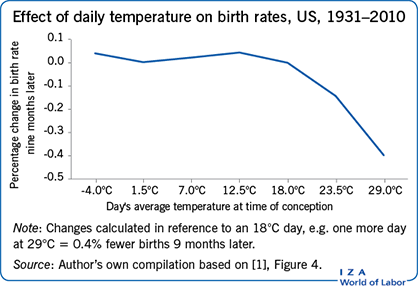Elevator pitch
Research finds that hot weather causes a fall in birth rates nine months later. Evidence suggests that this decline in births is due to hot weather harming reproductive health around the time of conception. Birth rates only partially rebound after the initial decline. Moreover, the rebound shifts births toward summer months, harming infant health by increasing third trimester exposure to hot weather. Worse infant health raises health care costs in the short term as well as reducing labor productivity in the longer term, possibly due to lasting physiological harm from the early life injury.
Key findings
Pros
Hot weather reduces birth rates eight to ten months later, with the largest reduction occurring at nine months.
Decline in births related to high temperatures is likely due to worse reproductive health at conception, not reduced sexual activity.
A modest rebound effect in birth rates occurs 11–13 months after high temperatures, partially offsetting the initial decline in fertility.
Air conditioning may help offset some of the negative effects of hot weather, though it may also exacerbate climate change.
Cons
The impact of hot weather on fertility is less clear in developing countries, where birth rates are typically higher and public health resources are limited.
More research with humans is needed to determine whether the impact on reproductive health is larger for males than females, as is suggested by animal studies.
The rebound in birth rates shifts births to summer months where children will be exposed to dangerous hot weather during the third trimester.
Compared with birth control policy or female labor market participation, temperature is less important for predicting historical changes in fertility or differences in fertility across countries.
